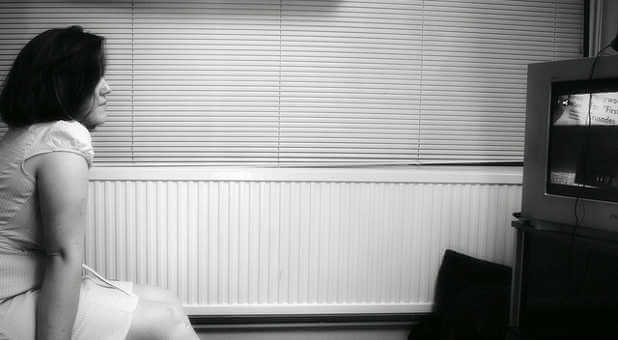It was my one guilty pleasure. At least that’s what I told myself when the kids were in bed, the dishes were done, and I was cozying up with a blanket in front of the TV. I had discovered the show late one evening when my husband had a meeting, and I was too exhausted to do anything productive. It was “trending” on Netflix, so I gave it a try. Two episodes in, I was hooked. The plot was addictive, the characters were gorgeous, and their world was so exciting.
So unlike my world.
Plus, it was a fairly “clean” show. I was halfway through the first season and the main characters had yet to even kiss. Actually, that was what made it exciting. (Are they ever going to get together?) It was so tragically romantic! So every night I grabbed the popcorn, flopped on the sofa, and told myself, “It’s way cleaner than the shows my friends watch. Way cleaner!”
There was just one problem. It bothered me.
It bothered me in the morning when I woke up to my mundane life with last night’s heart-racing episode fresh on my mind. It bothered me in the afternoon when I settled fights and folded laundry and counted the hours until everyone was in bed. It bothered me in the evening when I compared my comfortable relationship with my husband to the blossoming romance I’d been viewing onscreen.
“I think I need to stop watching this show,” I finally told a friend. “It’s putting me in a funk.” Then I quickly added (lest she judge me), “But it’s clean! It’s not like there’s any sex or nudity in it.”
The Relativity of Purity
In 2012, Ted Turnau wrote a book called Popologetics, which examines pop culture from a Christian perspective. The book taught me one life-changing truth: When it comes to consuming media, believers must consider more than just content; we must also consider context.
Content is readily observable. In fact many helpful websites, such as Focus on the Family’s Plugged In, report questionable content in movies so Christians can make wise choices. They have ratings for sex, nudity, violence, profanity—all the junk we want to avoid.
But context is a lot trickier. Let me give you an example. Several months ago, my husband and I stole away for the weekend to celebrate our anniversary. One night an old, classic movie came on TV. I had seen it a dozen times, but Clint took one look and said, “I can’t watch that movie.” “Really?” I asked. I knew there were a few bad scenes, and I told him I would skip those, but he shook his head. “It’s the way she dresses,” he said. “I don’t want to watch that.” I quickly turned it off. I was so thankful for his honesty.
The next night, an action flick came on. “Oh, I love this movie!” we both said at once. So we watched it. From a content standpoint, it scored an A+. There was little violence, virtually no profanity, and zero sex or immodesty. Not even a kiss.
But the movie stirred so much inside of me. The hero was handsome, strong, and invincible. He always rescued the girl just in time. When he fell ill, she nursed him back to health. They were a team, on the run, fighting for their lives, and fiercely protective of one another.
That night as I laid in bed, I thought about the two different movies. The first one had some questionable content, but none of it bothered me. The heroine’s outfits didn’t make me stumble, and the hero of the movie was old and unappealing to me. In the past, I watched it because I liked the storyline and thought it was funny. I always skipped the inappropriate scenes, and I forgot the movie the moment it was over.
But the second movie lingered in my mind, and worse yet, in my heart. It made me ache for a life that wasn’t real, for an adventure and a romance and a hero who couldn’t possibly exist. It made me long for a fantasy.
That is what Turnau means when he says context also matters. “Context” differs for each person. In other words, what’s pure for you may not be pure for me. James 4:17 says, “So whoever knows the right thing to do and fails to do it, for him it is sin.” In other words, there are times when the right thing for you to do (or not do) is subjective.
Now let me be clear: I absolutely believe there is a standard at which sin is sin across the board. Nobody can righteously claim, “Pornography may not be pure for you, but it’s pure for me.” There is a point at which “content” becomes so contrary to God’s Word that believers ought to take a stand against it. But too often, it’s tempting to judge another believer for watching “that show” on TV, when “my show” may be just as poisonous to my soul, even though it lacks explicit content.











































